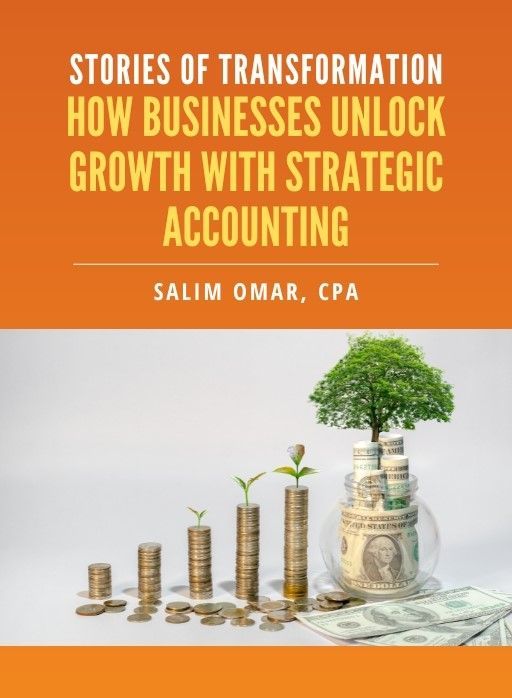The Hidden Risks of Waiting Until Q4 to Clean Up Your Books

There’s a funny thing about waiting until Q4 to deal with bookkeeping: it feels harmless—until it’s not. Every year, countless business owners push off their books until the eleventh hour. After all, Q4 seems like the logical time, right? The year’s wrapping up, it’s tax season soon, and everything gets neatly tied together. But here’s the catch: cleaning up your books at the last minute isn’t just stressful—it’s risky, and sometimes costly.
Straight Talk CPAs has seen how this Q4 scramble unfolds year after year. From missed deductions to IRS red flags, the dangers of procrastinated bookkeeping pile up fast. And if you're thinking it's just about data entry—think again. Let’s dive into why waiting too long to get your financial house in order could end up hurting more than helping.
Why Bookkeeping Procrastination Happens
It’s easy to understand why bookkeeping gets kicked down the to-do list. You’ve got sales to focus on, clients to serve, staff to manage, and new ideas to chase. But those unrecorded expenses and unreconciled bank statements don’t disappear—they accumulate.
Many business owners wait until Q4, thinking they’ll have a clearer view of the year. That’s valid in theory. But in practice? It creates a bottleneck of financial chaos when accuracy matters most.
Risk #1: Inaccurate or Incomplete Financial Data
Let’s start with the obvious—waiting until the last quarter to clean up books increases the likelihood of errors. Missing receipts, forgotten expenses, and duplicate transactions are common when trying to piece together months of records in a rush.
The longer you wait, the more details you forget. That dinner with a supplier in April? Gone from memory. That equipment purchase in June? Buried in a crowded inbox. Without consistent recordkeeping throughout the year, it’s hard to spot discrepancies or correct errors before they turn into bigger problems.
Even worse? Those errors get carried over to your tax return. And that’s not where you want mistakes living.
Risk #2: Missed Deductions = Missed Money
This one stings. When records aren’t clear or complete, tax deductions slip through the cracks. It's that simple.
Maybe you forgot to log mileage from that conference trip. Or you didn’t include that pricey software subscription from early in the year. These are real dollars left on the table. And once you’ve filed, you can’t go back and fix it without reopening your return—assuming you even catch the error.
Effective
tax planning requires visibility. When you wait until Q4 to play catch-up, there’s little time left to strategize or legally optimize your tax position. You’re stuck with what’s already happened—whether or not it was the smartest move.
Risk #3: Delayed Filings and Penalties
Tax season hits like a freight train. If your books aren’t clean by the time 1099s, W-2s, and other documents need to go out, you’re behind the curve. And if your accountant doesn’t get the information on time, expect delays—or worse, rushed work.
Late filings can lead to penalties and interest, even if you didn’t intend to fall behind. And let’s be honest, when January rolls around and you’re trying to close the year, plan for the new one, AND sort out messy books—it’s a lot.
Being proactive earlier in the year gives everyone breathing room. Waiting until Q4? That just adds pressure and shrinks your margin for error.
Risk #4: IRS Scrutiny
Let’s talk about audit risk. The IRS doesn’t flag returns at random. They look for inconsistencies, rounding errors, missing forms, and patterns that don’t line up. If your year-end books were pulled together quickly, you’re more likely to have reporting issues that attract attention.
For example, if your revenue numbers don’t match what your merchant processor reports, that’s a problem. If your expenses are suspiciously high for your industry, that’s a problem too. Cleaning up books properly takes time—and attention to detail. Neither of which are in high supply during the Q4 rush.
The more accurate and organized your records are, the less appealing you look as an audit target.
Risk #5: Poor Business Decisions Based on Bad Data
Books aren’t just for taxes. They’re a decision-making tool. But when your numbers are outdated or messy, the decisions that follow may be misinformed.
Thinking of hiring? Launching a new product? Expanding into a new market? You need clean, current financials to understand what’s possible—and what’s not. If you’re only reviewing your financials once a year, you’re running your business in the dark.
Smart companies look at their books monthly or quarterly, not just when taxes are due. Regular check-ins allow for small course corrections instead of major overhauls.
What Q4 Should Really Be For
Ideally, Q4 is the time to wrap things up, not start from scratch. It’s the season for tax planning, cash flow forecasting, and goal setting. But none of that’s possible if your numbers aren’t ready.
Here’s what Straight Talk CPAs recommends focusing on in Q4 if your books are already in good shape:
- Final
tax-saving strategies before year-end
- Employee bonuses and compensation planning
- Inventory reviews and write-downs
- Capital purchases and depreciation strategies
- Setting revenue and budget goals for next year
But all of that gets buried if you're knee-deep in sorting receipts and fixing balance sheet errors.
What to Do Instead
Cleaning up your books doesn’t have to be a painful, year-end ritual. Spread it out. Break it down. And don’t try to DIY everything if it's not your strength. That’s where a solid bookkeeping partner can make a world of difference.
Straight Talk CPAs helps businesses stay on top of their books all year long. That way, Q4 becomes a time of opportunity—not panic.
If you’re already behind? No judgment—just action. Here’s what can help:
- Prioritize cleaning up key months (start with Q1 and work forward)
- Review transactions for accuracy and categorization
- Reconcile bank and credit card accounts
- Get help with cleanup if needed—don’t go it alone
- Schedule a tax planning session before December
Free eBook:
Stories of Transformation


Salim is a straight-talking CPA with 30+ years of entrepreneurial and accounting experience. His professional background includes experience as a former Chief Financial Officer and, for the last twenty-five years, as a serial 7-Figure entrepreneur.




